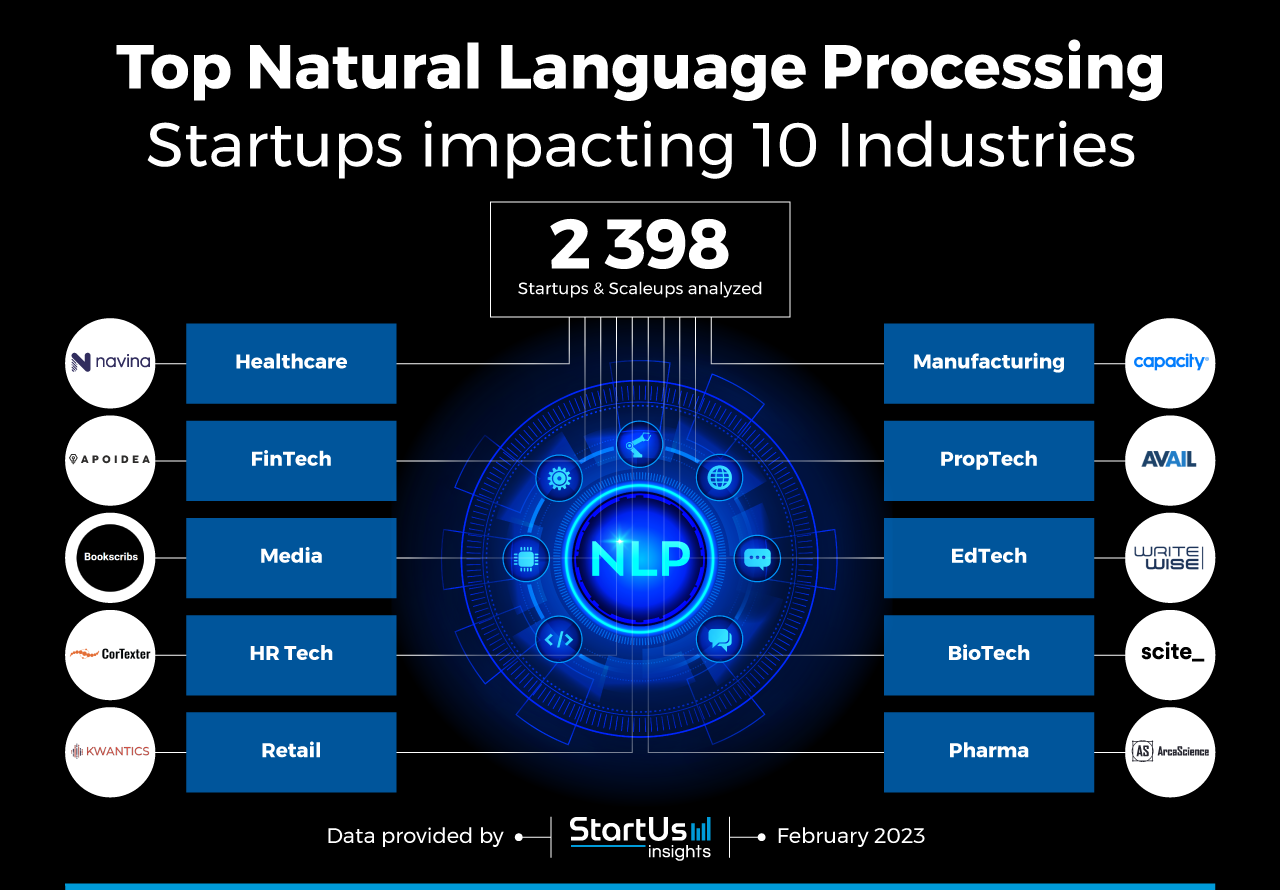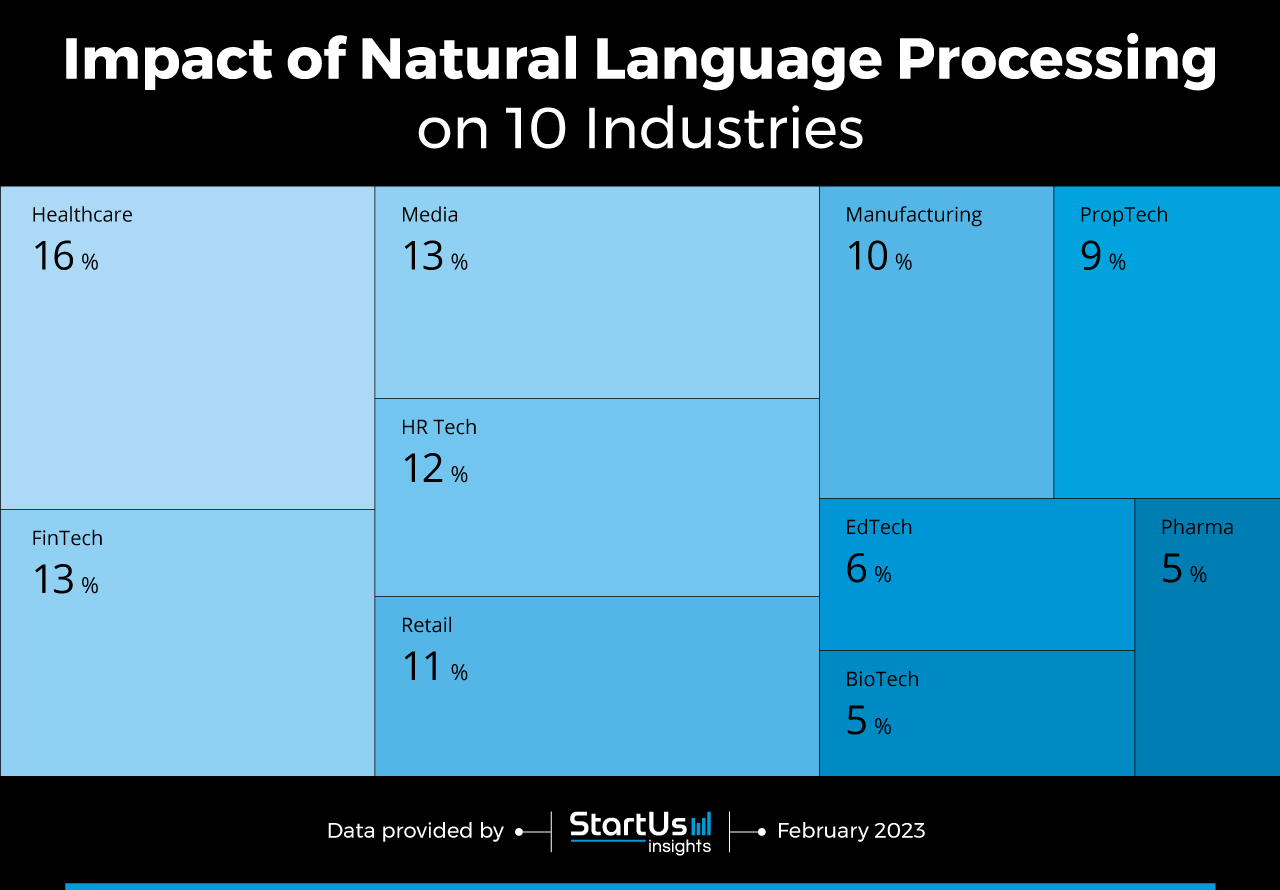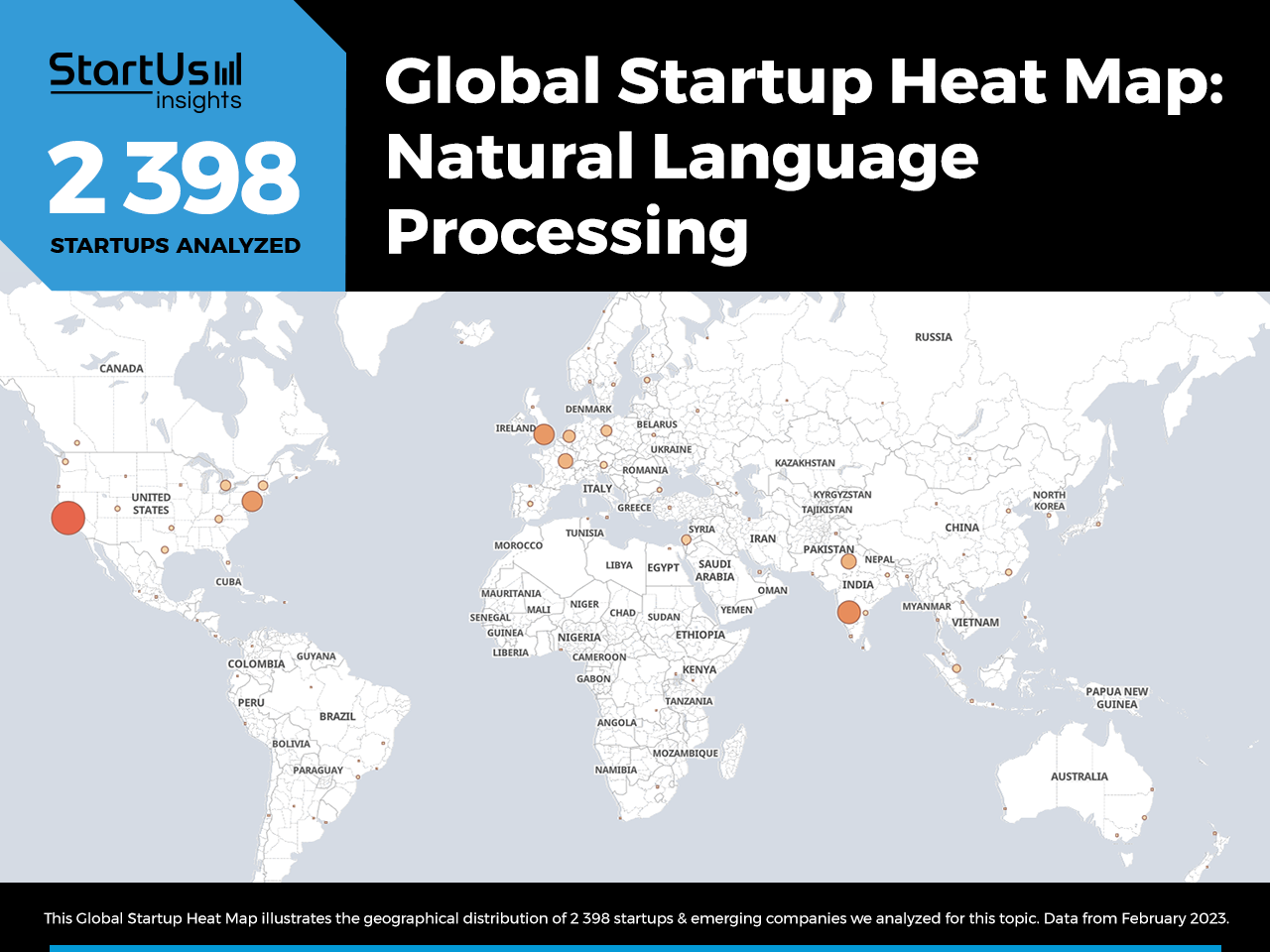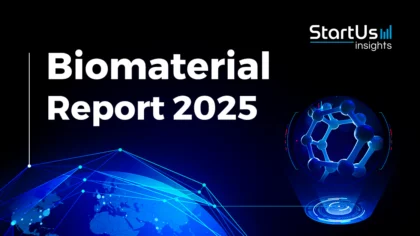While automating different processes across industries, there is an increasing emphasis on replicating human-like interactions. Natural language processing (NLP), the technology underlying conversational AI solutions among others, is at the forefront of this trend. We give you data-driven innovation insights based on our analysis of 2 398 NLP startups & technologies so that you do not miss out on emerging solutions to leverage natural language. For example, NLP-based platforms allow media, edtech, proptech, and healthcare companies to derive insights from documents of all kinds. Read more to explore the impact of NLP startups on 10 industries and how they advance your business.
Innovation Map highlights Top NLP Startups impacting 10 Industries
For this in-depth research on the Top Natural Langauge Processing Startups, we analyzed a sample of 2 398 global startups and scaleups. These insights are derived by working with our Big Data & Artificial Intelligence (AI)-powered StartUs Insights Discovery Platform, covering 2 093 000+ startups & scaleups globally. The platform quickly delivers an exhaustive overview of emerging technologies within a specific field as well as identifies relevant startups & scaleups early on.
In the Innovation Map below, you get an overview of 10 emerging NLP startups mapped to 10 industries they are optimizing. This research provides you with data-driven innovation intelligence that improves strategic decision-making by giving you an overview of emerging technologies & startups advancing natural language processing.
Tree Map reveals the Impact of NLP on 10 Industries
Based on the Innovation Map, the Tree Map below illustrates the impact of Natural Language Processing on 10 industries in 2023. Healthcare and fintech industries see the most activity among NLP startups to analyze large amounts of data to serve their customers and stay compliant with changing regulations. Media and edtech companies use NLP solutions to generate and analyze content as well as understand the behavior of their target audiences. In retail and real estate industries, NLP allows companies to improve their competitor and customer intelligence as well as increase customer interaction. Lastly, for biotech and pharma, the technology accelerates product discovery.
Global Startup Heat Map covers 2 398 NLP Startups & Scaleups
The Global Startup Heat Map below highlights the global distribution of the 2 398 exemplary startups & scaleups that we analyzed for this research. Created through the StartUs Insights Discovery Platform, the Heat Map reveals that the US has a high concentration of NLP startups, followed by the UK and India.
Below, you get to meet 10 out of these 2 398 promising startups & scaleups as well as the solutions they develop. These natural language processing startups are hand-picked based on criteria such as founding year, location, funding raised, and more. Depending on your specific needs, your top picks might look entirely different.
Impact of NLP on 10 Industries
1. Healthcare
With the digitalization of the healthcare industry, large amounts of health data are stored in electronic health records (EHRs). Analyzing these data provides rich clinical insights, but is time-consuming and expensive. NLP solutions automate EHR processing, freeing up healthcare workers for care delivery. The technology also enables solutions for clinical decision support and trial monitoring. For the latter use case, it enables computational phenotyping. Lastly, conversational chatbots find applications in mental healthcare and remote healthcare.
Navina simplifies Primary Care
Israeli startup Navina offers NLP-based diagnosis and care gap reviews. The startup’s platform analyses unidentified diagnoses through scanned documents, discharge reports, and hospital notes, among others. It then creates a contextual medical graph that links recommendations to relevant patient data. As a result, it turns unstructured clinical data into actionable patient portraits, allowing physicians to serve patients better and ensure compliance with quality metrics.
2. FinTech
A growing number of FinTech startups promote personal banking, lending, and investing behavior. NLP-based chatbots further reduce overhead costs for such startups, making them accessible to more customers. Virtual chatbots assist customers with banking tasks and provide insights into spending habits. For FinTech companies and banks, the value of natural language processing lies in quickly processing large amounts of documents. This takes the complexity out of functions ranging from anti-money laundering (AML) and customer verification to regulatory compliance.
Apoidea offers Market Summary Automation
Hong Kong-based startup Apoidea uses NLP to extract insights from financial texts. The startup’s solution combines semantic embedding with pre-trained language models to recognize language patterns and knowledge structures. It also analyzes the structure of tables and charts within documents. Additionally, the solution enables market summary automation by allowing stock traders and investors to quickly extract financial statements from documents and generate key insights from annual reports.
3. Media
No industry generates as much natural language data as the media industry. Naturally, it is one of the leading industries for NLP-based use cases. Media startups use NLP to summarize all kinds of content as well as to provide personalized recommendations to users. This also allows media organizations to get better metrics on their audience and, thereby, improve customer engagement and retention. Further, NLP solutions find use in content creation and marketing. More recently, startups leverage NLP-enabled content analytics to tackle fake news and disinformation.
Bookscribs provides Content Recommendations
US-based startup Bookscribs builds an AI-powered story discovery and adaptation platform. It uses machine learning and NLP to analyze and recommend content. The platform streamlines content curation for storytellers and producers to facilitate finding, understanding, and acquiring stories. This, in turn, allows story writers and producers to better adapt the story to capture the audience’s attention.
4. Human Resources (HR) Tech
Natural language processing has an impact on all aspects of the human resources industry. By quickly analyzing thousands of resumes, NLP speeds up the recruitment process while reducing bias. NLP-based chatbots automate interviews and catch minor details that may otherwise be missed. Further, onboarding and training with NLP solutions improve employee retention and engagement. The technology also provides deep insights into how employees feel, enabling employers to take relevant measures.
CorTexter creates a Digital Recruitment Assistant
Dutch startup CorTexter develops an AI-based digital recruitment assistant. It works both as a standalone solution as well as with existing applicant tracking systems (ATS) and HR management (HRF) software. The startup’s eponymous platform writes bias-free copy for job ads. This allows hiring managers to draft vacancy postings that attract more diverse candidates. Further, it enables HR teams to stay compliant with anti-discrimination regulations.
5. Retail
The retail industry sees a lot of customer interaction throughout the sales funnel. This is why the industry is transitioning to NLP-based bots to automate interactions before, during, and after sales. NLP-powered chatbots reduce overhead costs for retail businesses and allow them to serve more customers simultaneously. Startups use NLP to derive actionable insights from these conversations to further drive sales. It also enables semantic-based searches in online or digital retail, showing customers more relevant items.
Kwantics builds a Virtual Shopping Assistant
Indian startup Kwantics develops an AI-powered multilingual virtual shopping assistant. The intelligent voice bot uses NLP to understand customers’ speech and enable real-time natural conversations with customers. It also analyzes these conversations to provide insights on lost opportunities. This way, the virtual assistant reduces costs by providing both pre-sales and after-sales support.
6. Manufacturing
There is an increasing push towards industrial automation and streamlining operations in the manufacturing industry. By analyzing different kinds of documents, NLP-enabled solutions identify opportunities for improvement in manufacturing pipelines. Similarly, mining accident reports provide insights to improve worker safety. Manufacturing companies also run NLP algorithms on web-scraped content to provide a greater understanding of customer preferences and industry standards. Lastly, NLP also supports product design and demand-based production regimes.
Capacity enables AI-powered Support Automation
US-based startup Capacity offers AI-based support automation for multiple industries. Its conversational AI platform allows manufacturers to handle queries from customers at all times. It also supports internal teams to quickly access a company’s knowledge base, saving time. The solution works with existing data without the need to port it, providing manufacturers a low-effort way to tap into the strengths of NLP and other enterprise AI technologies.
7. PropTech
Real estate listings mention different data points that property agents have to manually go through. NLP automates both the collection of such data from different websites and their analyses. Not only does this speed up the processes, but it also identifies valuable insights into real estate markets. Further, NLP enables real estate agents to write better and more easily searchable ads, boosting traffic to their listings.
Avail AI offers Real Estate Risk Analysis
UK-based startup Avail AI provides AI-powered real estate risk analysis. It automatically analyzes title documents from the UK and highlights legal risks like charges or restrictive covenants. It then produces client-ready reports, including high-level red flags and title certificates. The startup’s solution works out of the box and features report scheduling as well. This way, it provides cost and time savings for real estate companies.
8. EdTech
Because of their ability to generate human-like text, NLP finds applications in solutions for reading and writing improvement. It matches students with educational content that is the most suited to their existing knowledge and aptitude. Conversational AI solutions also encourage particular learning behaviors, especially in online or self-learning tools, and automate grading. As in other industries, startups use NLP to generate automated summaries, which, in edtech, facilitates curriculum development and planning.
WriteWise delivers AI-based Writing Checks
WriteWise is a Chilean startup that provides an NLP-enabled solution for academic writing. It scans for errors and improves grammar and wording. Beyond structural improvements, it also makes the language more academically appropriate. The startup offers solutions for students, research groups, and universities. By improving the quality of writing, it allows these stakeholders to improve their research output.
9. BioTech
Life sciences research is often underutilized with little of it translating to clinical applications. Natural language processing solutions interpret vast amounts of scientific literature to derive novel insights as well as guide further research. Biotech text mining also supports the discovery of new metabolic pathways, with applications ranging from agriculture and materials to specialty chemicals. More recently, the industry uses NLP-based conversational AI solutions for compliance reporting and process automation as well.
scite facilitates Research Literature Classification
US-based startup scite develops a research literature classification solution. It scans over a billion citation statements to identify mentions of a protocol or reagent. Moreover, it tracks emerging citations that either support or refute previous research. This allows researchers to focus on experiments instead of spending hours looking up the scientific literature.
10. Pharma
Similar to the biotech industry, NLP is driving medical literature mining to inform early drug development. This reduces errors in data analysis in drug development pipelines. At the other end of the industry, it improves patient enrolment for clinical trials as well as customer targeting. NLP also extracts better insights from real-world evidence, improving the quality of decisions in clinical trials. Additionally, pharma companies employ NLP to improve internal search for safety reports, thereby reducing safety risks and improving compliance.
ArcaScience supports Biomedical Data Analysis
ArcaScience is a French startup that creates biomedical data analysis software. It gathers and analyzes all kinds of biomedical data to provide insights on pathology, adverse events, dosages, etc. The software enables translational studies, patient data profiling, efficacy studies, and adverse event reporting. Thus, ArcaScience supports pharma companies in leveraging unstructured and structured data to advance their processes.
Discover All NLP Startups
Startups leverage NLP to gather insights from different kinds of data as well as add a human element to their automated operations. Advances in generative AI and synthetic data will further improve the efficiency of NLP models and their adoption in the market. Get in touch to identify specific natural language processing startups & solutions that advance your business!












